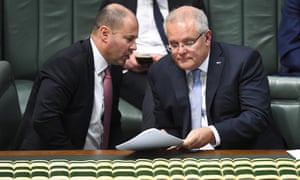The treasurer’s solemn pledge cuts off one of the few levers at his disposal to stimulate the economy
In a world where slogans carry surplus meaning, the Morrison government’s promised budget surplus is totemic.
If there was a single moment that sparked the dramatic turnaround in Coalition fortunes that culminated in its upset victory it was this confected/projected 2019 federal budget that would get the nation “back in the black”.
With the backing of pilfered ACDC riffs, blanket tabloid bouquets, and turbocharged by a multimillion-dollar taxpayer-funded advertising campaign, the treasurer, Josh Frydenberg, managed to hit reset on a dead government walking.
While the surplus was never more than a slogan, it framed the government’s economic credentials and set the scene for a sustained scare campaign on Labor tax “increases” that became more successful the sillier it got.
By election day six weeks later, the status quo was the safe bet,
Shorten was the Bill Australia couldn’t afford, and every well-thought
through and nuanced social policy that he unveiled became just further
proof that Labor couldn’t be trusted with our money.If there was a single moment that sparked the dramatic turnaround in Coalition fortunes that culminated in its upset victory it was this confected/projected 2019 federal budget that would get the nation “back in the black”.
With the backing of pilfered ACDC riffs, blanket tabloid bouquets, and turbocharged by a multimillion-dollar taxpayer-funded advertising campaign, the treasurer, Josh Frydenberg, managed to hit reset on a dead government walking.
While the surplus was never more than a slogan, it framed the government’s economic credentials and set the scene for a sustained scare campaign on Labor tax “increases” that became more successful the sillier it got.
And it all started on budget night when the government solemnly pledged it would deliver a surplus in 2020 – albeit propped up by an NDIS underspend – come hell or high water.
Of course the government never expected to have to deliver on this promise – it was salting the fields for the incoming Labor government, creating an unreachable target to condemn their opponents’ economic management when the electorate had done its job.
Now six months on they are still in charge and the economy is starting to soften, with the International Monetary Fund downgrading growth projections to just 1.7% and urging the government to provide some economic leadership by using its budget to stimulate the economy.
For a government that has built its mandate on slogans and economic snake oil, this is a tough call. The treasurer’s solemn pledge cuts off one of the few levers at his disposal. With close to zero interest rates and flatlining wages, the government doesn’t have many other cards to play.
While the prime minister, Scott Morrison, clings defiantly to the promised surplus, most respondents in this week’s Essential Report would rather see the government inject the funds into the economy.
Collateral damage for stimulus will also be exposing their long-running criticism of Labor’s assured handling of the last global financial crisis. Awkward, yes? But prohibitive, I’m not sure.
A second set of questions shows that the public is not ready to blame the government for the current state of affairs. They recognise that with a Trump White House cooking up trade wars with China, there is going to be collateral damage outside any local government’s control.
Indeed, fewer than one third of voters give primary responsibility to the government’s economic management. For now.
TABLE 2
What this means is that there is actually very little political reward for Coalition governments delivering a surplus because people expect them to be the better economic manager anyway. They are 15 points ahead on this measure and have been that way for many years of good and bad fortune.
The risk for the government is that if it clings to the slogan it will prompt the downturn that will cost jobs. That’s the lived experience that will let the opposition back in the game.
Perversely, breaking a central election promise could be the government’s only viable political option.
• Peter Lewis is an executive director of Essential. He wrote Webtopia: the World Wide Wreck of Tech and How to Make the Net Work

No comments:
Post a Comment